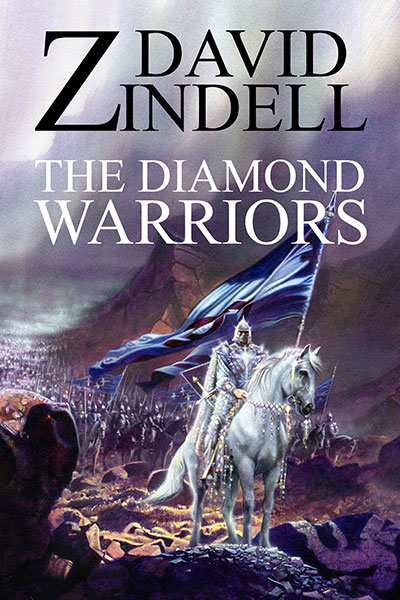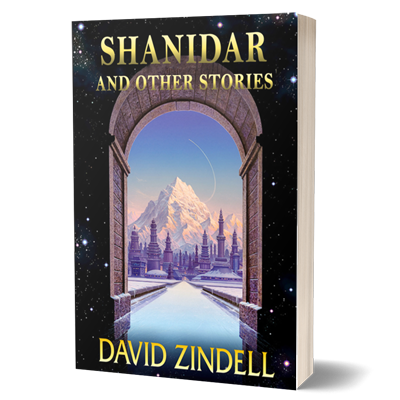 This is the story of a man who becomes a king. Valashu Elahad, a son of kings – all descended from the Elahad who led the ancient Valari to Ea – has been born to rule the realm of Mesh. He has been raised on all the noble Valari virtues and schooled in war. No man wields a sword with as much skill; no other knight, lord or ruler applies the stratagems of battle with such genius. And yet this essentially gentle and empathic man would rather call out poems rather than commands, and he would rather turn his hand toward stroking a woman’s hair or playing his flute.
This is the story of a man who becomes a king. Valashu Elahad, a son of kings – all descended from the Elahad who led the ancient Valari to Ea – has been born to rule the realm of Mesh. He has been raised on all the noble Valari virtues and schooled in war. No man wields a sword with as much skill; no other knight, lord or ruler applies the stratagems of battle with such genius. And yet this essentially gentle and empathic man would rather call out poems rather than commands, and he would rather turn his hand toward stroking a woman’s hair or playing his flute.
As The Diamond Warriors opens, it seems unlikely that Val will ever be king. He has endured injustice and disgrace, and has been banished from Mesh. He has lived as an outcast, practically as an outlaw. It doesn’t matter that he is the last of the Elahads, or that the warriors of Mesh honored Val’s father as one of Mesh’s greatest kings. For the warriors must honor him: no man may come to the kingship of Mesh except through their will. They take great pride in electing their kings.
I am not sure how I could have written things differently. A part of me, as an American, loathes the idea of anyone ruling over anyone else. I always thought it a greatly noble act when after the Revolutionary War George Washington refused the kingship offered him. He would not rule his fellow Americans. He would lead them instead.
It might seem that he thus rejected great power. I don’t see things that way. Many kings have ruled through gaining a monopoly on violence. People obey them out of terror, because if they don’t the king will send his soldiers to punish them. The office of kingship can easily encourage a man to become a dictator or a despot. But tyrannical power is always more fragile than it looks. Tyrants expend great effort in defeating plots against them and hunting down the assassins and rivals always trying to cast them off their thrones. They must continually play off one faction against another, as if following the schemes of Machiavelli. They even fear that their sons or their families will try to usurp them. They are the loneliest people in the world.
But there is another type of king, what I would call a true king. This king seems to live out an archetype buried deep within our psyches and our myths. He rules not by right of birth or divine ordinance but through a natural nobility.
In Rob Roy, that famous outlaw explains to his sons about honor. “Not all kings have honor,” he tells them, “but all men who have honor are kings.”
This is even more true of a quality I have called splendor. Although I have never been able to define it, splendor shines like a star that points the way toward all that is best and brightest in humankind. This star can be found high in the heavens, like a supernova among the constellations, but also deep within the heart. In some it sputters weakly like a spark, while in others it blazes.
Those who radiate splendor are the true kings of the human race, and they wield the only true power. Through their words, whispers and deeds – through the very light of their eyes – they breathe the sparks in others into a fiery life and thus call people to their own inherent splendor.
On the world of Ea, in the universe called Eluru, the One meant for various Maitreyas to arise from the Ardun at the end of every age. Through their resonance with the Lightstone, these rare beings were to use the golden cup to awaken people to the divine gift of splendor. In this sense, the Maitreyas could be called Lords of Light or cosmic kings.
The Maitreyas’ power, however, extends only into the spiritual realm. In the more earthy realm where common people live and vie with each other for supremacy, a different kind of power is needed. Until those of the Ardun have learned to abide by the Law of the One and have progressed toward the higher orders of humanity, they must participate in the order provided by kings.
Here I use the words “participate in” and not “submit to.” In the Valari ideal of choosing their kings, power flows freely from the warriors doing the choosing up to their king. The king’s real power parallels that of the Maitreya. His vision, wisdom and passion for the good of his people touch off in his warriors bright flames. These then spread, like fire. The warriors pass torches from hand to hand, and then from thousands of hands to their king. As one, warriors and king come together to accomplish a bright, blazing purpose.
Valashu Elahad knows that what really fuels this fire is love. A king must sometimes ask his warriors to die for him. He must be even more ready to die for them. Love alone forges this willingness to sacrifice life for the sake of greater life.
Val recognizes that his greatest task will be to love. He loves easily the men of Mesh. These men of the earth – often simple blacksmiths and farmers – wear sparkling diamonds affixed to black leather to form their armor. They try to be like bright diamonds, in their fearlessness and their flawlessness. They work hard to polish their souls. The people of Ea call them the Diamond Warriors. They call themselves brothers, who live and die for each other. Already, in his early twenties, Val has led many of them to war.
If he is to be king, he will need to convince all of them that Mesh must fight the greatest war in all the ages of Ea – the culminating war in a great, cosmic struggle that has gone on for untold ages of the universe. How is he to do that? He begins by learning the name of every warrior in his army: more than ten thousand of them. This seems an impossible feat. Only through the power of his silver sword – its silustria opens his mind to memory – does he accomplish it. It takes him days to hear all the warriors speak their names one by one and for him in turn to speak his name to them. In giving voice to who they really are, in gazing at each other’s bright, black eyes, they are really giving each other love.
So many instead have opposed Val with hate. Even some of his own countrymen, at first, try to stop him from being king. Lord Tanu vies with him for the throne. So does Lord Tomavar, who challenges Val to a duel and tries to cut him in two with his murderous sword.
The other Valari kings do not want to see Val become Lord of Mesh. They fear the swords and spears of the incomparable Meshian army – as they do the firestone that Val’s friend, Maram, wields. Even more they fear what Valashu Elahad, as king, might require of them.
Morjin, of course, will do anything to slay his young enemy. He gathers the armies of many lands to invade Mesh and to exterminate the whole Valari people. He gets help from his master, the Baaloch, imprisoned on the world of Damoom. Through a hole in the earth known as the Skadarak, this fallen god sends a swirling blackness called the Ahrim to slay Val.
The inspiration for this dark, mysterious, deadly force I drew fromForbidden Planet. In that classic movie, an alien race called the Krell has developed a fantastically powerful array of machinery to instantiate the workings of the mind. That which the mind can conceive can take form as matter or be applied as energy. The power of the Krell gives new meaning to the old saying: be careful what you wish for lest you get it.
In Forbidden Planet, a human scientist named Dr. Morbius has learned the secrets of the Krell. However, he has not learned its real danger: the Krell’s machinery sets loose the dark energies of his subconscious mind. These “monsters from the Id” then nearly destroy visitors whom Morbius perceives as a threat – and that which Morbius loves most along with them.
I did not intend the Ahrim to be a monster created deep within Val’s mind. The Baaloch creates the Ahrim out of the universe’s dark, nihilistic energies; Val takes no part in that. But the Ahrim possesses a strange property: it has no power to harm Val other than what Val gives it. The more he fights it and hates it, the more it harms him.
So it goes with Morjin. As in many stories about good vs. evil, Val learns the danger of opposing evil too completely: we become what we hate. Val may fight Morjin, he might even kill him, but he must not hate him.
In fact, as he learns to his horror, according to a prophecy he cannot doubt, he must find a way to love Morjin. Only through a deep sense of identity born of compassion will he be able to completely understand Morjin. And only then will he be able to wield the valarda – the force of his soul – to defeat him.
It took a long, long time for this sentiment to work its way into my heart. More than thirty years before, I had heard the Moody Blues’song, The Balance, and these words:
And with his eye of compassion
He saw his enemies like unto himself,
And he learned love.
Then, he was answered.
So, then, love really is all we need. And heroes like Val really can save the world. I have to admit that I hesitate writing words like that, just as I thought very hard before writing this series of novels. Save the world? How presumptuous! How cliché!
And yet every moment we act heroically, every moment we say “yes” and take risks or pains to accomplish something good, even in the smallest of things such as sacrificing sleep to care for our children, we fill that moment with an imperishable brightness. Every time we fight for goodness, truth and beauty and live for love, we create something perfect and eternal. In this we are like the Galadin in creating the world out of the stuff of their own bodies. And in creating, we gain a stake in preserving, and in preserving we save. In the end, we all do save the world for our children and for our children’s children’s children.
Who does not, secretly, want to fight the good fight? Who does not want the good inside to win out? How can we live without splendor?
A true king understands the deepest purpose of our kind. He knows that we are all warriors, made of pure diamond. And ultimately, we are all born to be kings, for that is what it means to be human.
Purchasing Links
Lord of Lies can be purchased at the following online stores.
Print version: Amazon
Ebook: Amazon • Barnes and Noble • Kobo • Apple Store • Smashwords

